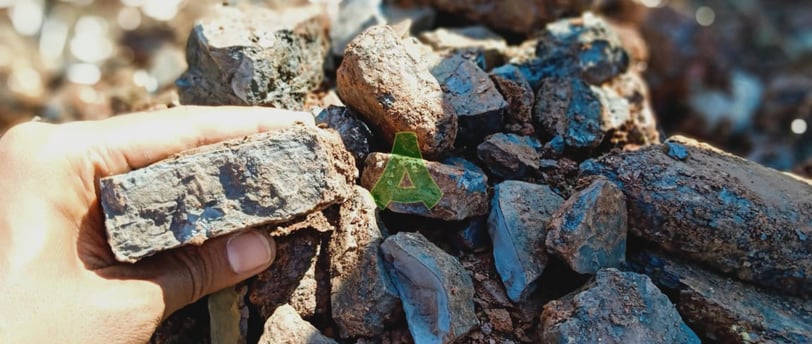What is Manganese Ore: Origin, Use and Future Prospects
Manganese is essential for iron and steel production. Used in steel alloys to improve characteristics such as strength, hardness and durability.
KNOWLEDGE
Planning Team
7/24/2024


Definition and Origin of Manganese Ore
Manganese is a type of mineral whose main content is manganese (Mn), a chemical element that is important in various industrial processes. The definition of manganese includes various forms of the mineral, such as pyrolusite (MnO2), which is most commonly found in the oxide form. The chemical composition of manganese can vary depending on the type of mineral and the concentration of other elements.
Geologically, manganese ore are formed through a sedimentation process which involves the precipitation of manganese oxides from manganese-rich solutions. This process often occurs in marine and terrestrial environments, especially in areas that have high oxidation conditions. Apart from that, manganese ore can also form through hydrothermal processes, where hot solutions rich in manganese precipitate in cracks in igneous or metamorphic ore.
In Indonesia, manganese ore deposits are found in various regions such as East Nusa Tenggara, Sulawesi and Kalimantan. These areas have geological conditions that support the formation and accumulation of manganese ore deposits. Apart from Indonesia, significant manganese reserves have also been found in countries such as South Africa, Australia and Brazil.
The discovery of manganese has a long history, stretching back thousands of years. Manganese was first identified as a chemical element by the Swedish chemist, Johan Gottlieb Gahn, in 1774. Since then, manganese has become a major concern in the mining and metallurgical industries due to its wide-ranging benefits in a variety of applications, from steelmaking to battery production.
Use of Manganese Ore in Various Industries
Manganese ore has a variety of significant applications in various industries. One of the main uses of manganese is in the steel and metallurgical industries. Manganese functions as an important alloying material to increase the strength and corrosion resistance of steel. By adding manganese to steel, this material becomes more durable and able to withstand pressure and corrosive environments. These advantages make manganese an essential component in the production of high-quality steel used for construction, heavy equipment and infrastructure.
Apart from that, manganese also plays an important role in the battery industry, especially in making lithium-ion batteries. Lithium-ion batteries are a vital component in modern electronic devices such as smartphones and laptops, as well as increasingly popular electric vehicles. Manganese is used in battery cathodes to increase the energy density and longevity of the battery. The use of manganese in these batteries helps meet the need for efficient and sustainable energy in advanced technology and electric mobility.
The chemical industry also uses manganese in various applications. One important use is in the manufacture of fertilizer. Manganese is a micro element that plants need for optimal growth. By adding manganese to fertilizer, the quality of agricultural products can be improved. In addition, manganese is used in making dyes and pigments. Manganese provides certain colors needed in various products, from textiles to paint, so it has added value in the chemical industry.
With its diverse applications, manganese plays an important role in industrial technology innovation and development. The widespread use of manganese shows how vital this resource is in supporting various economic and technological sectors now and in the future.
Production Capacity and Prospects for Manganese Ore in Indonesia
Indonesia has great potential in manganese production, with various regions being the main producers. According to the latest data, manganese production in Indonesia has reached significant numbers, making this country an important player in the global market. Regions such as South Kalimantan, Southeast Sulawesi and East Nusa Tenggara are known as major producers of manganese, contributing greatly to national production capacity.
Several factors influence manganese production capacity in Indonesia. One of the main factors is the quality of the reserves owned. High and good quality manganese reserves enable higher productivity. Apart from that, adequate mining and transportation infrastructure also plays an important role in increasing production efficiency. Other factors include supportive government regulations, as well as the availability of skilled labor and modern technology used in the mining process.
Demand for manganese in domestic and international markets is also an important driver in increasing production. The need for the steel and battery industry, which uses manganese as raw material, continues to increase along with the development of various industrial sectors. This opens up opportunities for producers in Indonesia to increase production capacity and meet increasingly high demand.
The prospects for developing the manganese ore industry in Indonesia are very promising. Investment opportunities are wide open, both from domestic and foreign investors. Technological innovation in mining and processing processes can also increase efficiency and add value to manganese products. Apart from that, the broad global market potential provides a great opportunity for Indonesia to increase manganese exports to various countries.
With various supporting factors and existing potential, the manganese industry in Indonesia has bright prospects in the future. Sustainable development of this sector can make a significant contribution to the national economy and improve Indonesia's position as one of the main manganese producers in the world.
